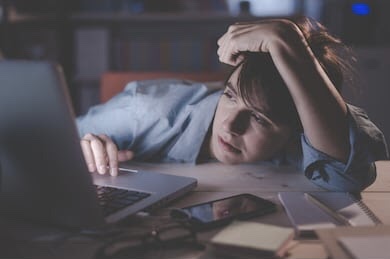Unstable sleep schedules: a high school student’s sleep during distance learning

In March of 2020, the nation packed up their backpacks and went home from school, expecting two weeks of at-home learning. It’s now November of 2020, and we still have yet to return. The regular sleep pattern of the average high school student is already awful to begin with, so what happens when they’re doing school from home? Have students experienced a loss in sleep, or a significant gain, and what does this mean in terms of long-term health?
Distance learning makes a more flexible schedule for students, but with flexibility can come major procrastination. Due to this procrastination students are more likely to stay up later. Also, given students don’t necessarily have to do a proper morning routine or uphold a some-what put together image as they would if they were going to school, they are more likely to disregard the importance of sleep.
Junior Emma George said this about her own experience. “I would say the effect of distance learning on my sleep schedule has been very poor. I guess being in front of electronics all day makes it harder to fall asleep so I stay up until two or three in the morning. The next day I’m tired during classes too so it just makes a vicious cycle.”
However, a study published by the National Center for Biotechnology Information conducted by high school students in Quebec, Canada, shows that they saw an approximately two hour increase in the average sleep time of students. Junior Peter Radovich said, “Since school starts at nine instead of eight in the morning, I would say I get more sleep. If we had our normal school schedule I would be getting up a lot earlier.”
Bellarmine implemented a 9 a.m. start time starting Nov. 9 after two months of our normal school schedule. Some students are taking advantage of this extra hour, and some are using it as an excuse to stay up later. A massive decrease in sleep can lead to many other issues concerning the well-being of students, such as an increase in depression, anxiety, and other physical health related problems. It can also lead to underperforming academically— grades can drop very easily, and when a student isn’t getting enough sleep it can be challenging to focus during class and retain information. When grades drop, stress levels accelerate, and, like Emma George said, it becomes an ongoing cycle.
The overwhelming increase in the use of technology because of distance learning can be detrimental to a students sleeping pattern. However, some students do benefit from the later start time, so it’s really up to the individual student. Hopefully we can resume a normal schedule soon for students to re-assimilate back into normal high school life.

Taraneh Moeini is a senior and is extremely excited to be on The Lion staff this year. She has two shih tzus that she loves more than anything...
